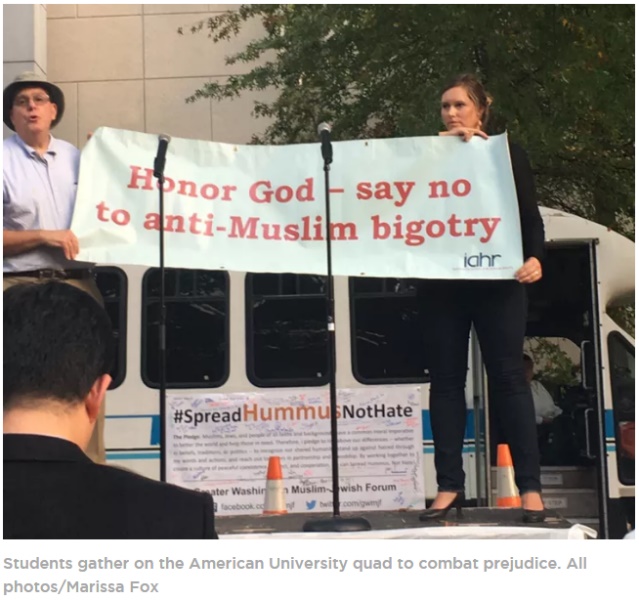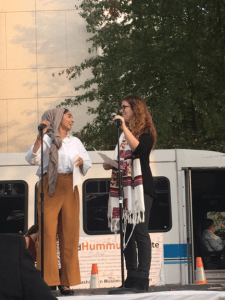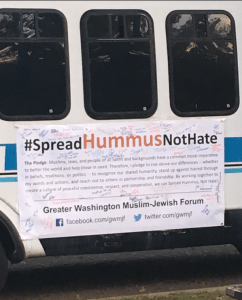
Moment Magazine
By Marissa Fox

The stickers read “Spread Hummus, Not Hate.” On the American University quad Oct. 20, people wore them as a reminder that we all have a part in conflict resolution.
The event was run by the Greater Washington Muslim-Jewish Forum, which ties together Muslim and Jewish activists, and co-sponsored by a collection of religious and academic groups. Throughout the day, advocates and chaplains alike spoke about the trials and tribulations involved with furthering peace between ethnic groups. Students, professors and religious leaders took the stage to discuss their faiths, their experiences with hatred and prejudice and their thoughts on peace.
 Muslim and Jewish advocates separately led the audience in prayer, and then they tied the sermons together. They chanted a Jewish prayer of peace, which spoke of justice and equity “for insider and outsider alike,” and a Muslim prayer, “God is the greatest.” Finally, they chanted a prayer of three words, tying together Jewish and Muslim phrases: “Peace Salaam Shalom.” Two Chaplains, one Jewish and one Muslim, stood up together on the stage and recited separate prayers, eventually speaking in unison: “And as is written in both the Talmud and the Quran, if anyone killed a person, it would be as if he had killed all of mankind. And if he saved a person, it would be as if he saved all of mankind.”
Muslim and Jewish advocates separately led the audience in prayer, and then they tied the sermons together. They chanted a Jewish prayer of peace, which spoke of justice and equity “for insider and outsider alike,” and a Muslim prayer, “God is the greatest.” Finally, they chanted a prayer of three words, tying together Jewish and Muslim phrases: “Peace Salaam Shalom.” Two Chaplains, one Jewish and one Muslim, stood up together on the stage and recited separate prayers, eventually speaking in unison: “And as is written in both the Talmud and the Quran, if anyone killed a person, it would be as if he had killed all of mankind. And if he saved a person, it would be as if he saved all of mankind.”
Ambassador Akbar Ahmed, Ibn Khaldun Chair of Islamic studies, told the crowd that he joined the university around the time of the 9/11 attacks. In the aftermath of the disaster, he said, “a chasm had opened between communities and religions,” and since then Islamophobia has continued to grow. But while he saw hate, he also saw an opportunity to fight oppression—and an opportunity for the country to learn about the Muslim community.
 Now, the upsurge of Islamophobia and anti-Semitism around the presidential election is apparent, said Walter Ruby of the Foundation for Ethnic Understanding. Muslims and Jews, he added, should come out in public and commit to standing up for each other in the face of discrimination. And no matter what happens during the election, he stressed that both denominations are there for each other. Kathryn Orsborn, director of the Shoulder to Shoulder campaign to stop anti-Muslim bigotry, spoke about the Religious Freedom Pledge, which 100 leaders of different faiths have signed, and encouraged that we put pressure on our elected officials to stand up for these ideals.
Now, the upsurge of Islamophobia and anti-Semitism around the presidential election is apparent, said Walter Ruby of the Foundation for Ethnic Understanding. Muslims and Jews, he added, should come out in public and commit to standing up for each other in the face of discrimination. And no matter what happens during the election, he stressed that both denominations are there for each other. Kathryn Orsborn, director of the Shoulder to Shoulder campaign to stop anti-Muslim bigotry, spoke about the Religious Freedom Pledge, which 100 leaders of different faiths have signed, and encouraged that we put pressure on our elected officials to stand up for these ideals.
But for many, prejudice starts early in life—a reality evident as two AU students, one Jewish and one Muslim, spoke about their childhoods. Their upbringings in the suburbs of Chicago and Boston differed, but the prejudice they experienced did not. The Muslim student explained that in high school, when she decided to wear her hijab, half of her friends stopped speaking to her. The Jewish student recalled when, in the fourth grade, another student told her she had killed Jesus. It is evident that prejudice and ignorance comes from the teachings of our parents, something both students said they discovered in their schooling. Despite this, the students were quick to urge that we remain allies, quoting Martin Luther King Jr: “I decided to stick with love. Hate is too great a burden to bare.”
Throughout the day, students sat on the grass chanting and reciting the prayers of both ideologies. There was a long line forming for students to enjoy hummus, pita bread and an assortment of vegetarian food. “Hungry college kids can’t resist free food,” an AU alum joked. A cantor chanted the Hare Krishna mantra, a call of service, as the food given to AU for the event was a service to humanity. Men and women of both faiths took photographs of the event and watched intently as the call for peace went on. There was a light fall breeze, and the delicious Middle Eastern food and sense of positivity spread throughout the audience and the event. “Go out,” Ahmed said, “and heal a fractured world.”
Copyright © 2025 Foundation For Ethnic Understanding. All rights reserved. | Privacy Policy